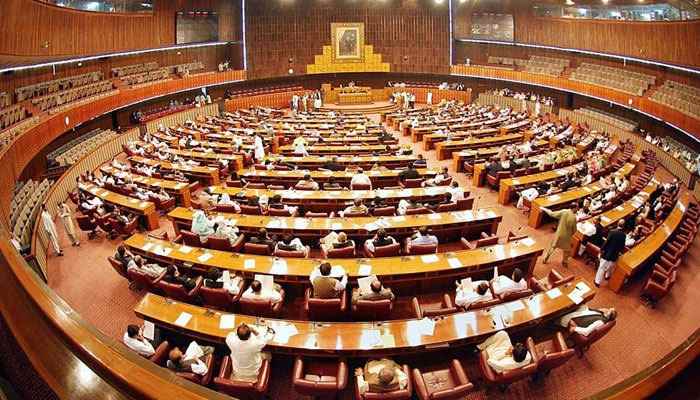NAB amendment bill 2022 presented in National Assembly
Bill will not be applicable to transactions under government amnesty schemes and board of directors of state-owned enterprises
July 28, 2022

- No person shall be appointed judge unless serving district and sessions judge, says bill.
- It says NAB will file reference once investigation is completed.
- NAB chairman, prior to filing of reference, is authorised to terminate proceedings deemed unjustified, says ordinance.
ISLAMABAD: A bill was presented in the National Assembly Wednesday to further amend the law regulating the National Accountability Bureau (NAB), which proposed exemption of the transactions or amount under government amnesty schemes and board of directors of state-owned enterprises.
State Minister for Law and Justice Shahadat Awan presented the National Accountability (Second Amendment) Act, 2022, in the lower house to amend the National Accountability Ordinance, 1999 (NAO).
Establishment of courts and appointment of judges
The bill stated that the federal government shall establish as many courts as it may deem necessary to try offences under the ordinance and a judge shall be appointed by the federal government after consultation with the chief justice of the high court concerned.
The judge will hold office for a term of three years from the date of their initial appointment.
“No person shall be appointed as judge unless he is a serving district and sessions judge or additional district and sessions judge, while a judge shall not ordinarily be removed or transferred by the federal government before completion of his term, except after consultation with the chief justice of the high court,” it stated.
No supplementary reference will be filed
The ordinance said that the trial of a suspect would be conducted in the jurisdiction of the same court where they might have committed a crime.
According to the bill, NAB will file a reference once the investigation is completed and no additional reference will be filed.
However, “if [the] investigation reveals new facts, a supplementary reference will be filed with the permission of the court.”
Plea bargain agreement
The ordinance, referring to the plea bargain, said: “An accused entering into a plea bargain or voluntarily return shall not prejudice a case of any other accused, however, in case of failure of accused to make payment in accordance with the plea bargain agreement approved by the court, the agreement of plea bargain shall become inoperative to the rights of parties immediately.”
“If an accused challenges validity of order approving plea bargain or it comes to the knowledge of the court otherwise that plea bargain was a result of pressure exerted, the court after hearing both parties may recall the approval of plea bargain,” it added.
Withdrawal and termination of pending proceedings
Regarding withdrawal and termination of pending proceedings, the bill further said that the NAB chairman, prior to the filing of a reference, is authorised to terminate proceedings deemed unjustified with consultation of the prosecutor-general.
“After the filing of a reference, if the chairman NAB in consultation with the prosecutor-general, having regard to the totality of fact, the circumstance is of the view that the reference is partly or wholly unjustified, he may recommend to court approval where the matter is pending that the reference may partly or wholly be withdrawn or terminated and upon such withdrawal or termination,” it said.









